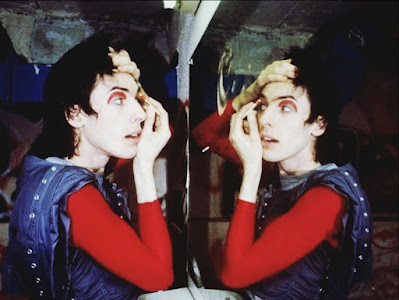Unknown and obscure band, Locomotive (originally The Locomotive) were a British band in the 1960s, from Birmingham. Their musical styles ranged from jazz to psychedelic rock and ska, and their original line-up featured Chris Wood, later of Traffic, and drummer Mike Kellie of Spooky Tooth. Birmingham's Locomotive took a strange musical path, but on their way this innovative band created
several classics. Traffic's Chris Wood was an early member, but it was vocalist/guitarist Norman Haines who took control. Having recorded for the Direction label, Locomotive moved to Parlophone for "Rudi's In Love", a bluebeat/rocksteady song which established the group's name. However, Haines then pulled an abrupt volte-face, unleashing the almost gothic "Mr Armageddon" in 1968. Haines then completed Locomotive's lone album "We Are Everything You See" with the aid of Mick Taylor (trumpet), Will Madge (keyboards), Mick Hincks (bass) and Bob Lamb (drums), before disbanding them altogether and forging The Norman Haines Band.
They had a minor UK hit in 1968 with "Rudi's in Love", before turning to progressive rock with their
only album, "We Are Everything You See", released in 1970. The group was formed in 1965, originally as the Kansas City Seven, by trumpeter Jim Simpson, with singer Danny King, saxophonists Chris Wood and Brian "Monk" Finch, organist Richard Storey, bass player Pete Allen, and drummer Mike Kellie. All the members had previously played in local bands in Birmingham.
Chris Wood remembered; "We were playing what I then thought was jazz but now know was twelve-bar sequences on piano, bass and drums. We'd do the occasional wedding reception, social club, British
Legion meeting on Saturdays. You'd have to play standard waltzes and foxtrots, but we tried to do as much jazz as we could get away with." The band was first known as "The Kansas City Seven" but this was later considered too jazzy for a future chart act who were now including lots of blues and soul numbers into their show. The group gained recognition for their energetic live performances and soon had bookings for as far away as London where they played many times.
Locomotive recorded an album at the Abbey Road Studios in London with producer Gus Dudgeon. By this time, however, the band decided to perform more progressive rock, based around Haines' keyboard
skills. Because of their uncertainty over how it would be received, the record company delayed the release of the album. A single, a version of a Question Mark and the Mysterians song, "I'm Never Gonna Let You Go", was released but failed to make the chart. Haines left the group in 1969, reportedly turning down an offer to join Black Sabbath and eventually forming the Norman Haines Band.
Locomotive Disbanded in 1971. Haines died in 2021, aged 75.
For those not familiar with this album, "We Are Everything You See" is a wonderful mix of late 1960s British psychedelia and early progressive rock with some tracks having heavy jazz overtones.
MEMBERS
Norman Haines - lead vocals, piano, organ, mellotron, harpsichord,
Mick Hincks - bass, backing vocals, lead vocal (B3), laughter
Bob Lamb - drums, percussion, facial expressions
John Caswell - Vocals, Electric Guitar, Twelve-String Guitar
Keith Millar - Vocals, Electric Guitar, Twelve-String Guitar, Piano, Organ, Mellotron, Harmonica
Pete Allen bass guitar (left in 1966)
Mike Kellie drums (left in 1966)
Danny King lead vocal (left in 1966)
Brian "Monk" Finch saxophone (left in 1966)
Jim Simpson trumpet (left in 1967)
Richard Storey saxophone, organ (left in 1966)
Chris Wood saxophone, flute (left in 1966)
Joe Ellis bass guitar (joined 1966 - left 1967)
Norman Haines lead vocal, keyboards (joined 1967, left 1970)
Bill Madge saxophone (joined 1966, left 1969)
"Mooney" Mazzone drums (joined 1966 - left 1967)
John Barry saxophone (joined 1966 - left 1967)
Mick Hincks bass guitar, vocal (joined in 1967)
Bob Lamb drums (joined in 1967)
Mike Taylor trumpet (joined 1968, left 1969)
John Caswell guitar, vocal (joined in 1970)
Keith Millar guitar, keyboard, vocal (joined in 1970)
Andy Hughes bass guitar
SINGLES
Broken Heart/A Message To You Rudi (Direction 583814) 1967
Rudi's In Love/Never Set Me Free (Parlophone R 5718) 1968 (25)
Mr. Armageddan/There's Got To be A Way (Parlophone R 5758) 1969
I'm Never Gonna Let You Go/You Must Be Joking (Parlophone R 5801) 1969
Roll Over Mary/Movin' Down The Line (Parlophone R 5835) 1970
ALBUMS
We Are Everything You See (Parlophone PCS 7093) 1970
Label: Zap! – ZAP 5
Format: Vinyl, LP, Album, Reissue
Country: UK
Released: 1988
Genre: Rock
Style: Psychedelic Rock, Prog Rock
SIDE ONE
A1. Overture
Arranged By – Nigel Phillips/Written-By – Nigel Phillips, Norman Haines
A2. Mr Armageddon
Written-By – Norman Haines
A3. Now Is The End - The End Is When
Written-By – Mick Taylor
A4. Lay Me Down Gently
Written-By – Norman Haines
A5. Nobody Asked You To Come
Written-By – Nigel Phillips, Norman Haines
A6. You Must Be Joking
Tenor Saxophone [Solo] – Chris Mercer, Lynn Dobson/Written-By – Norman Haines
A7. There's Got To Be A Way (Written-By – Norman Haines)
SIDE TWO
B1. A Day In Shining Armour
Written-By – Nigel Phillips, Norman Haines
B2. The Loves Of Augustus Abbey - Part One
Written-By – Nigel Phillips, Norman Haines
B3. Rain
Arranged By [Strings] – Nigel Phillips/Lead Vocals, Written-By – Mick Hincks
B4. The Loves Of Augustus Abbey - Part Two
Written-By – Nigel Phillips, Norman Haines
B5a. Coming Down
Written-By – Moskowitz, J. Byrd
B5b. Love Song For The Dead Che
Written-By – J. Byrd
B6. The Loves Of Augustus Abbey - Part Three
Written-By – Nigel Phillips, Norman Haines
B7. Time Of Light And Darkness
Written-By – Norman Haines
B8. I'm Never Gonna Let You Go
Arranged By – Paul Buckmaster/Written-By – George Fischoff
Recorded at E.M.I Studios - Abbey Road
Originally released on February 01, 1970 by Parlophone Records (UK), LP - PCS 7093, re-released in 1988 by Zap Records (UK), LP - Zap5
%20-%20Front%20Cover.jpg)









%20-%20Back%20Cover.jpg)


%20-%20Vinyl%20Side%20A.jpg)
%20-%20Vinyl%20Side%202.jpg)












































